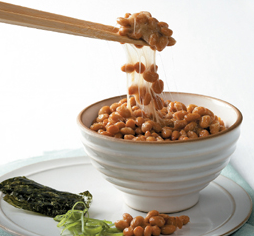 Over the years we have all read conflicting reports about the benefits of Soy in our diets. Some news has been scary. Other reports have been most positive. Consequently, it was most reassuring to see the results of a major study released in the December 2009 issue of the Journal of the American Medical Association (JAMA) that studied the intake of soy protein in patients who had breast cancer.
Over the years we have all read conflicting reports about the benefits of Soy in our diets. Some news has been scary. Other reports have been most positive. Consequently, it was most reassuring to see the results of a major study released in the December 2009 issue of the Journal of the American Medical Association (JAMA) that studied the intake of soy protein in patients who had breast cancer.
This study looked at over 5,000 patients and found that those individuals who had the highest intake of soy protein and isoflavones they contain, had the longest survival and the lowest risk of breast cancer recurrence.
This study has defined the use of soy foods that are rich in isoflavones, a major group of phytoestrogens, should be encouraged. And now, further study has shown that even if you have cancer and are taking drugs like tamoxifen, that you should actually be encouraged to consume soy protein containing isoflavones such as genistein.
Soy food intake and breast cancer survival.
Soy critics point to the fact that genistein, an isoflavone in soy, could promote the development of breast cancer, and should be avoided. Genistein is primarily an estrogen antagonist. There are two estrogen receptors in the body. The alpha receptor (ER1) is responsible for mammary gland growth. The beta receptor (ER2) was only discovered in 1996. Its function or role in the body is only now becoming understood. In breast tissues, the beta receptor is considered an inhibitor of alpha receptor (ER1) mediated growth. In fact, the beta receptor (ER2) apparently plays this role in many other cancers as well.
Since genistein does have a small capacity to activate the alpha receptor (ER1), physicians have discouraged women at risk for breast cancer or those who presenty have breast cancer from ingesting genistein rich foods such as soy. This is a mistake. The alpha receptor (ER1) is 10,000 to 50,000 times more sensitive to estrogen than it is to genistein. Further, genistein binds and activates the beta receptor (ER2) 100 times more effectively than it does the alpha receptor (ER1). The optimal treatment protocol for breast cancer is to use an antagonist of the alpha receptor (ER1) and an agonist or activator of the beta receptor (ER2). Genistein is an activator of the estrogen beta receptor (ER2).
Clinical significance of estrogen receptor beta in breast cancer.
But a new study reveals interesting results about genistein. In this study genistein has been shown to promote the growth of estrogen receptor positive (ER+)/erbB-2-overexpressing breast cancer cells (known as luminal type B and noted in approximately 10 to 20% of breast cancers). In ER-negative (ER-)/erbB-2-overexpressing (erbB-2+) cells, genistein has been shown to inhibit cell growth through its tyrosine kinase inhibitor activity. Researchers found that genistein induced enhanced cellular proliferation and tamoxifen resistance in ER-positive/erbB-2-overexpressing breast cancers by ER-erbB-2 cross talk and p27/kip1 downregulation. These responses were accompanied by increased phosphorylation of the alpha receptor (ER1) and ER signaling, without increase in ER protein levels.
Genistein’s ability to activate the alpha receptor (ER1) can be blocked with melatonin, the sleep hormone. Melatonin does not block the activity of the beta receptor (ER2). In addition, melatonin is an inhibitor of aromatase activity, the enzyme that converts testosterone to estrogen. If a woman is diagnosed with an estrogen responsive cancer, she should immediately begin taking melatonin and soy foods rich in genistein. Synthetic drugs are not necessary. In addition, genistein is a general tyrosine kinase inhibitor, which means it inhibits the activity of the growth promoting EGF and HER-2 receptors.
Estrogen-signaling pathway: a link between breast cancer and melatonin oncostatic actions.
Melatonin as a selective estrogen enzyme modulator.
Melatonin modulates aromatase activity in MCF-7 human breast cancer cells.
Melatonin, an endogenous-specific inhibitor of estrogen receptor alpha via calmodulin.
Genistein is a double edged sword for the treatment of cancer. At low concentrations, it can promote cancer cell growth. At high concentrations, it can kill cancer and leukemia cells in probably 50 different ways.
Modulation of gene methylation by genistein or lycopene in breast cancer cells.
The consumption of soy-based foods and ingredients in North America, Europe and most of the non-Asian world is extremely low. Therefore, Americans have little or no genistein in diets. The assumption that high soy intake among Asian women explains their low breast cancer risk has led to numerous studies carried out in human populations and animal models. Human studies suggest that genistein exposure during the period preceding puberty reduces later susceptibility to develop breast cancer. The reduction in breast cancer risk induced by early genistein exposure is also likely to reflect changes in the expression of multiple genes. For example, in animal models, prepubertal exposure to genistein causes a persistent upregulation of Brca1 and it might upregulate PTEN. PTEN is one of the most commonly lost tumor suppressors in human cancer. Complete inactivation of the PTEN gene is extremely common in advanced cancer. The PTEN phosphatase inhibits the PI-3K/AKT cell growth/survival pathway.
The role of early life genistein exposures in modifying breast cancer risk.
Phytoestrogen exposure elevates PTEN levels.
Negative regulation of PKB/Akt-dependent cell survival by the tumor suppressor PTEN.